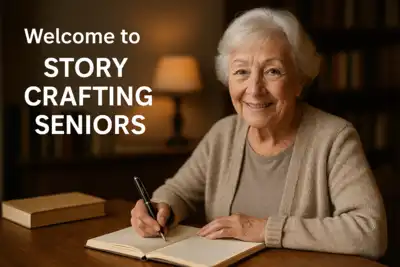Story Development Tips for Seniors

Crafting a compelling story is more than just putting words on a page; it's about connecting with readers and conveying meaningful experiences. Senior writers have a wealth of life stories to share, and mastering story development can help them articulate their narratives with impact. So, what are the key elements that can elevate your writing journey?
What You Will Learn
- Story Development Essentials: Understand plot structure, character arcs, and thematic depth as the foundation of engaging narratives.
- Overcoming Challenges: Learn to tackle self-doubt and technology barriers through workshops and tutorials tailored for seniors.
- Relatable Characters: Craft authentic protagonists and antagonists by incorporating personal experiences, backstories, and realistic flaws.
- Conflict Resolution Techniques: Keep readers engaged by mastering climactic moments, character decisions, and open-ended resolutions.
- Structured Frameworks: Utilize step-by-step frameworks to outline core ideas, characters, settings, and plot sequences effectively.
- Helpful Templates: Streamline your writing process with templates for character development, plot structures, and dialogue refinement.
- Creative Exercises: Enhance writing skills through free writing, character interviews, and flash fiction activities that inspire creativity.
- Visual Storyboarding: Use storyboarding techniques to visualize your narrative flow and enhance pacing and structure.
Key Elements of Story Development for Senior Writers
Understanding the fundamentals of story development is essential for senior writers. The following elements break down the core aspects of crafting engaging narratives. For more insights into refining your craft, consider exploring writing creatively in your retirement.
Plot Structure
Establish a clear beginning, middle, and end to guide the reader through the narrative.
Character Arcs
Develop growth and transformation in characters to create engaging and relatable personas.
Themes
Infuse deeper meanings and messages throughout the story to connect with readers on a profound level.
Conflict Resolution Techniques
Employ techniques such as climactic moments and open-ended resolutions to maintain reader interest.
Understanding the Importance of Story Development for Senior Writers
As a writer, I believe that understanding the importance of story development is crucial, especially for seniors who are eager to share their unique experiences. Every story we tell is a piece of ourselves, and nurturing that narrative is essential for crafting captivating fiction. In this journey, seniors can explore their creativity and enrich their writing by honing their story development skills.
Defining Story Development in the Context of Modern Writing
Story development refers to the process of shaping a narrative from the initial idea to a fully realized piece. It encompasses several elements, including plot structure, character arcs, and themes. In modern writing, this also involves understanding how to connect with readers on a deeper level by incorporating relatable elements into the story.
For senior writers, mastering story development allows us to convey our thoughts and feelings effectively. By building a strong foundation for our stories, we create an engaging experience that resonates with readers. This is a crucial step in our journey as storytellers, as it invites them to immerse themselves in our narratives. To further enhance your storytelling abilities, explore various writing techniques for older adults.
- Plot Structure: Establishing a clear beginning, middle, and end.
- Character Arcs: Developing growth and transformation in characters.
- Themes: Infusing deeper meanings and messages throughout the story.
Common Challenges Faced by Senior Writers
While every writer encounters challenges, senior writers may face unique obstacles that can hinder their storytelling journey. For instance, some may struggle with self-doubt or feel intimidated by the changing landscape of modern writing. Additionally, navigating technology and online platforms can be a bit daunting.
However, overcoming these challenges is possible! Embracing the writing process with confidence and determination is key. Here are some common challenges and tips to tackle them:
- Self-Doubt: Attend writing workshops at Story Crafting Seniors to boost your confidence.
- Technology: Seek out tutorials that simplify the use of digital platforms.
- Writing Style: Experiment with different genres and styles to find your voice.
Character Development: Crafting Relatable Protagonists and Antagonists
Characters are the heart of any story! Crafting relatable protagonists and antagonists is vital for drawing readers in. As a senior writer, I find that infusing elements from my own life into my characters makes them more relatable. This personal touch helps create authenticity and allows readers to connect with the characters on a deeper level. For more guidance, discover how to create engaging characters for senior stories.
To develop compelling characters, consider the following:
- Backstory: Give your characters a rich history that influences their actions.
- Motivations: Understand what drives your characters, making them relatable.
- Flaws: Perfect characters are less engaging; add imperfections for depth.
Conflict Resolution: Techniques for Maintaining Reader Interest
Every great story has conflict! It propels the narrative forward and keeps readers engaged. As writers, we must learn how to resolve these conflicts in a way that feels satisfying and authentic. I often remind myself that the resolution should reflect the character's journey, showcasing growth and transformation.
Here are some effective techniques for conflict resolution:
- Climactic Moments: Build up to a pivotal scene that changes everything.
- Character Decisions: Have your characters make choices that influence the outcome.
- Open-Ended Resolutions: Sometimes, leaving some questions unanswered can spark further interest.
By embracing story development, seniors can tell their powerful stories with confidence. Let's dive into our storytelling journeys and uncover the narratives waiting to be shared! Whether you’re a beginner or a seasoned writer, remember that every tale is worth telling and sharing with the world.
Quick Summary
Here's a brief recap of the key points discussed so far:
- Story Development: Understanding the elements of plot structure, character arcs, and themes is vital for senior writers.
- Common Challenges: Seniors face unique obstacles, including self-doubt and adapting to technology, but can overcome them with confidence and resources.
- Character and Conflict: Crafting relatable characters and effectively resolving conflicts are essential for engaging storytelling.
Frequently Asked Questions about Story Development for Senior Writers
-
What are the essential elements of story development for senior writers?
The essential elements include plot structure (clear beginning, middle, end), character arcs (growth and transformation), and themes (deeper meanings and messages).
-
What common challenges do senior writers face in story development?
Senior writers may encounter challenges such as self-doubt, adapting to new technologies, and finding their unique writing style. Workshops and tutorials can help overcome these.
-
How can senior writers create relatable characters?
To create relatable characters, senior writers should focus on developing rich backstories, clear motivations, and realistic flaws. Infusing personal experiences can also add authenticity.
-
What techniques are effective for conflict resolution in a story?
Effective conflict resolution techniques include building up to climactic moments, having characters make impactful decisions, and sometimes using open-ended resolutions to maintain reader interest.
-
What practical tools and exercises can help senior writers with story development?
Practical tools include step-by-step frameworks, character development templates, plot structure templates, and creative exercises like free writing, character interviews, and flash fiction. Storyboarding is also useful for visualizing narrative flow.
Practical Exercises and Templates for Effective Story Development
As a senior writer, embracing the creative process can be exciting and fulfilling! However, to truly bring your stories to life, practical exercises and templates can provide the structure and guidance you need. At Story Crafting Seniors, we believe in empowering you with tools that not only refine your writing skills but also spark your creativity.
One effective way to start your story development journey is by using step-by-step frameworks designed specifically for engaging storytelling. These frameworks can help organize your thoughts, ensuring that your narrative flows smoothly and captivates your readers. Let’s dive deeper into some practical frameworks and templates that can elevate your writing!
Step-by-Step Frameworks for Crafting Engaging Stories
Utilizing structured frameworks can transform the way you approach story development. Here are some essential steps to consider:
- Identify Your Core Idea: What is the main theme or message you want to convey? For ideas on themes that resonate with your audience, consider exploring themes that resonate with seniors.
- Outline Your Characters: Create profiles for your protagonists and antagonists, focusing on their motivations and relationships.
- Establish the Setting: Describe the world in which your story takes place, including time, place, and atmosphere.
- Map Out the Plot: Develop a clear sequence of events that lead your characters through challenges and resolutions.
By following these steps, you create a strong foundation for your narrative! Remember, each story is unique, so feel free to adjust this framework to suit your personal writing style.
Templates Tailored for Senior Writers’ Unique Needs
Templates can greatly ease the burden of starting from scratch. Here are a few templates that can assist you in organizing your thoughts and ideas:
- Character Development Template: Include sections for physical description, personality traits, goals, and conflicts.
- Plot Structure Template: Outline the beginning, middle, and end, with key plot points highlighted.
- Dialogue Template: Create a format to write and refine dialogue that feels natural and authentic.
Having these templates at your fingertips can streamline your writing process, making it easier for you to focus on the creative aspects of storytelling. Don’t hesitate to personalize them, adding elements that resonate with your unique voice.
Creative Writing Exercises to Boost Your Writing Skills
Engaging in creative writing exercises can spark inspiration and enhance your skills! Here are some exercises you might enjoy:
- Free Writing: Set a timer for 10 minutes and write continuously. Don’t worry about grammar or structure; just let your thoughts flow!
- Character Interviews: Write a series of questions and answer them in the voice of your character. This helps deepen your understanding of their personality.
- Flash Fiction: Write a complete story in 300 words or less. This hones your ability to convey a message succinctly.
These exercises not only sharpen your writing skills but also encourage you to explore new ideas and perspectives, unlocking your creativity!
Storyboarding: Visualizing Your Narrative Flow
Storyboarding is a fantastic method for visual learners! It allows you to map out your narrative visually, making it easier to identify any gaps or areas that may need more development. Here’s how you can get started:
- Gather Your Materials: Use sticky notes, index cards, or a digital tool to create your storyboard.
- Outline Key Scenes: Write a brief summary of each scene and place it on the storyboard.
- Arrange and Rearrange: Don’t hesitate to move scenes around to find the best order for your story!
By visualizing your narrative flow, you can gain a better understanding of pacing and structure, helping you to create a more engaging story. Embrace this method, and watch your narrative come to life! For more methods to enhance your storytelling, consider exploring storytelling techniques for seniors.
Recap of Key Points
Here is a quick recap of the important points discussed in the article:
- Story Development: Essential for seniors to shape narratives through clear plot structures, character arcs, and themes.
- Overcoming Challenges: Address self-doubt and technology hurdles through workshops and tutorials to build confidence in writing.
- Character Development: Create relatable characters by incorporating personal experiences, rich backstories, and realistic flaws.
- Conflict Resolution: Maintain reader interest by crafting climactic moments and allowing characters' decisions to drive outcomes.
- Practical Frameworks: Utilize step-by-step frameworks to identify core ideas, outline characters, and map out plots.
- Creative Exercises: Engage in writing exercises like free writing and flash fiction to enhance creativity and skills.
- Storyboarding: Visualize narrative flow to identify gaps and improve pacing through organized scene mapping.
Popular Posts
 Engaging with fiction is not just a pastime; it can significantly enhance the mental and emotional w
Engaging with fiction is not just a pastime; it can significantly enhance the mental and emotional w
 Writing a memoir isn't just about recounting events; it's a deeply personal journey that can connect
Writing a memoir isn't just about recounting events; it's a deeply personal journey that can connect
 Crafting stories for seniors is not just about the plot; it's about creating connections and evoking
Crafting stories for seniors is not just about the plot; it's about creating connections and evoking
 Storytelling is more than just a way to share experiences; it is a powerful tool for self-expression
Storytelling is more than just a way to share experiences; it is a powerful tool for self-expression

